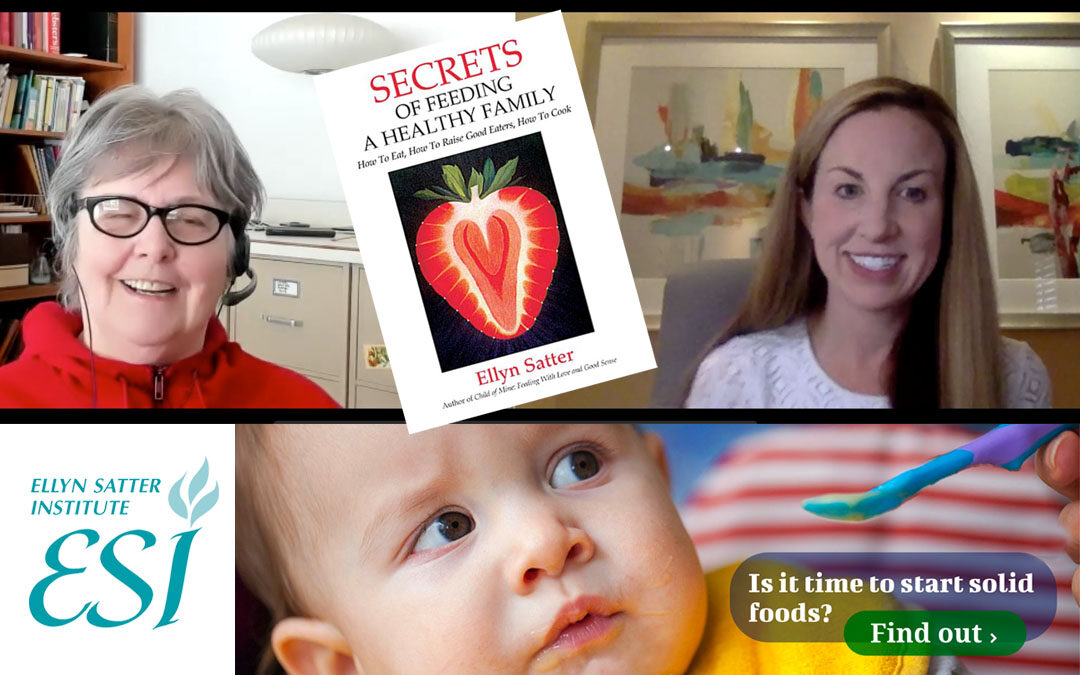Last month I had the opportunity to interview someone who has long been a hero of mine. Ellyn Satter is a dietician, family therapist, and child feeding guru. She is the author of several books and booklets, including Child of Mine: Feeding with Love and Good Sense, Secrets of Feeding a Healthy Family, and Your Child’s Weight: Helping Without Harming, intended to guide families and professionals in feeding children in a way that promotes life-long health and happiness. She is most well-known for her Feeding Dynamics Model and Eating Competence Model, which address food, feeding, emotional health, and positive family relationships. Her work has been so transformative that the non-profit Ellyn Satter Institute was created to carry on the legacy of her vital research.
I was first introduced to her work circa 2009. At that time, I was in the midst of my pediatric residency training and a new mom. At this point, the majority of my education about children’s nutrition had centered around the what of feeding. Specifically, which nutrients were most important for children to consume, which vitamins might be at most risk for a deficiency, and, of course, which foods may put children at most risk for health concerns such as obesity.
Although science and medicine had seemingly figured out the exact amount of calories and nutrients children needed to grow and be healthy, something was being lost in translation. As a pediatrician, I saw some of the most significant challenges facing the families I cared for surrounded feeding. While the specific issues varied from child to child, the themes were relatively consistent with most concerns related to “picky” eating or quantity of intake (either too much or too little). I saw first hand the increasing prevalence of obesity among kids and the physical and emotional toll it could take. As I watched children enter adulthood already dealing with medical issues related to their diet and lifestyle, I realized that poor feeding habits are the most significant threat to our children’s health. I listened to parents complain about the struggles and stress they experienced around feeding their kids.
As a new mom, I quickly learned that even with the best intentions, activities involving a child rarely go as planned, including feeding. I knew (or thought I knew) exactly what and how much my son should be eating, but, of course, that didn’t mean that’s what he did.
Thankfully, that short “lunch and learn” presentation given to this tired young mom and doctor struck a chord.
Ellyn’s work emphasizes the how of feeding much more than the what. She stresses that following infancy, the most important thing is structure in feeding. Specifically, having set meals and snack times. This means not allowing children to “graze” all day and ensures that they will develop a sense of food security as they can reliably predict that parents or caregivers will feed them. Additionally, she promotes a Division of Responsibility in feeding in which the parent decides when, where, and what will be offered for each meal. The child is allowed to determine if they will eat and how much of whatever is provided. The process involves some planning and taking ownership of one’s parental duty and also involves TRUSTING the child to eat in a manner that is right for their body.
And the data supports it. Given freedom within the framework of the division of responsibility, children eat a varied and adequate diet. Although it may not always seem like it within a single day, research shows that they will eat well when looking at a child’s weekly diet. Although one day they may eat very little, the next day they may eat a lot more. One day may be full of fruit, and the next full of crackers. The parents control what food to offer, so they don’t have to worry that all the child will eat is buttered noodles.
That’s the beauty of working with kids. In general, their bodies and brains know how to care for themselves intuitively. Our job as adults is to support this by making sure that they are being fed reliably in a structured manner and offered a variety of foods to support good nutrition.
I love Ellyn and her work because they support a HEALTHY WAY of feeding children. Changing the way we look at feeding makes improvement accessible to everyone. Regardless of socioeconomic status or family structure, Ellyn’s work meets parents and caregivers where they are and teaches them how implementing even small changes in the “how” of feeding can reap tremendous benefits.
It is precisely this kind of innovative thinking about childhood nutrition that we support at the Shikhar and Kristin Saxena Foundation. Looking at core issues and understanding ways to approach them in a new, transformative way are at the heart of our efforts. We seek research-based models for improving kids’ lives and helping them grow into happy, healthy adults.
I encourage you to learn more about the Ellyn Satter Institute by checking out their website at: http://www.ellynsatterinstitute.org

